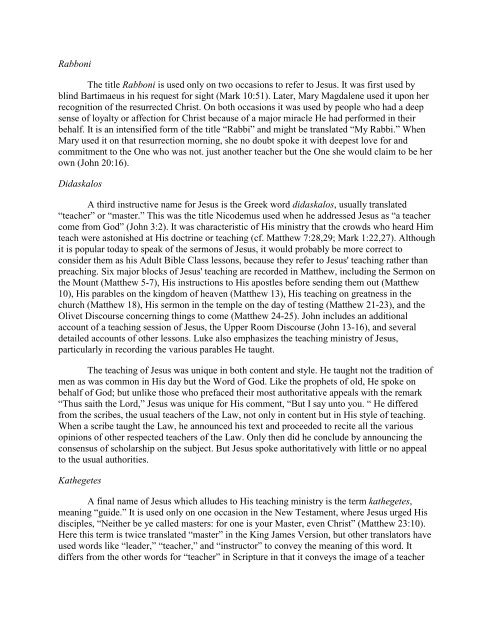The Names of Jesus - Elmer Towns
The Names of Jesus - Elmer Towns
The Names of Jesus - Elmer Towns
- TAGS
- elmer
- towns
- elmertowns.com
You also want an ePaper? Increase the reach of your titles
YUMPU automatically turns print PDFs into web optimized ePapers that Google loves.
Rabboni<br />
<strong>The</strong> title Rabboni is used only on two occasions to refer to <strong>Jesus</strong>. It was first used by<br />
blind Bartimaeus in his request for sight (Mark 10:51). Later, Mary Magdalene used it upon her<br />
recognition <strong>of</strong> the resurrected Christ. On both occasions it was used by people who had a deep<br />
sense <strong>of</strong> loyalty or affection for Christ because <strong>of</strong> a major miracle He had performed in their<br />
behalf. It is an intensified form <strong>of</strong> the title “Rabbi” and might be translated “My Rabbi.” When<br />
Mary used it on that resurrection morning, she no doubt spoke it with deepest love for and<br />
commitment to the One who was not. just another teacher but the One she would claim to be her<br />
own (John 20:16).<br />
Didaskalos<br />
A third instructive name for <strong>Jesus</strong> is the Greek word didaskalos, usually translated<br />
“teacher” or “master.” This was the title Nicodemus used when he addressed <strong>Jesus</strong> as “a teacher<br />
come from God” (John 3:2). It was characteristic <strong>of</strong> His ministry that the crowds who heard Him<br />
teach were astonished at His doctrine or teaching (cf. Matthew 7:28,29; Mark 1:22,27). Although<br />
it is popular today to speak <strong>of</strong> the sermons <strong>of</strong> <strong>Jesus</strong>, it would probably be more correct to<br />
consider them as his Adult Bible Class lessons, because they refer to <strong>Jesus</strong>' teaching rather than<br />
preaching. Six major blocks <strong>of</strong> <strong>Jesus</strong>' teaching are recorded in Matthew, including the Sermon on<br />
the Mount (Matthew 5-7), His instructions to His apostles before sending them out (Matthew<br />
10), His parables on the kingdom <strong>of</strong> heaven (Matthew 13), His teaching on greatness in the<br />
church (Matthew 18), His sermon in the temple on the day <strong>of</strong> testing (Matthew 21-23), and the<br />
Olivet Discourse concerning things to come (Matthew 24-25). John includes an additional<br />
account <strong>of</strong> a teaching session <strong>of</strong> <strong>Jesus</strong>, the Upper Room Discourse (John 13-16), and several<br />
detailed accounts <strong>of</strong> other lessons. Luke also emphasizes the teaching ministry <strong>of</strong> <strong>Jesus</strong>,<br />
particularly in recording the various parables He taught.<br />
<strong>The</strong> teaching <strong>of</strong> <strong>Jesus</strong> was unique in both content and style. He taught not the tradition <strong>of</strong><br />
men as was common in His day but the Word <strong>of</strong> God. Like the prophets <strong>of</strong> old, He spoke on<br />
behalf <strong>of</strong> God; but unlike those who prefaced their most authoritative appeals with the remark<br />
“Thus saith the Lord,” <strong>Jesus</strong> was unique for His comment, “But I say unto you. “ He differed<br />
from the scribes, the usual teachers <strong>of</strong> the Law, not only in content but in His style <strong>of</strong> teaching.<br />
When a scribe taught the Law, he announced his text and proceeded to recite all the various<br />
opinions <strong>of</strong> other respected teachers <strong>of</strong> the Law. Only then did he conclude by announcing the<br />
consensus <strong>of</strong> scholarship on the subject. But <strong>Jesus</strong> spoke authoritatively with little or no appeal<br />
to the usual authorities.<br />
Kathegetes<br />
A final name <strong>of</strong> <strong>Jesus</strong> which alludes to His teaching ministry is the term kathegetes,<br />
meaning “guide.” It is used only on one occasion in the New Testament, where <strong>Jesus</strong> urged His<br />
disciples, “Neither be ye called masters: for one is your Master, even Christ” (Matthew 23:10).<br />
Here this term is twice translated “master” in the King James Version, but other translators have<br />
used words like “leader,” “teacher,” and “instructor” to convey the meaning <strong>of</strong> this word. It<br />
differs from the other words for “teacher” in Scripture in that it conveys the image <strong>of</strong> a teacher
















